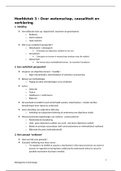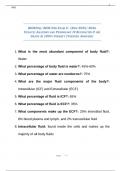care
P2: Explain how sociological perspectives contribute to the understanding of society
M1: Analyse the contribution of sociological perspectives to the understanding of health and
social care and society.
TASK 1: SOCIOLOGICAL PERSPECTIVES
In this assignment I am going to write about how sociological concepts and perspectives are applied
to the study of health and social care. I will also be explaining how sociological perspectives are
applied to the understanding of health and social care and how sociological perspectives contribute
to the understanding of society. I will also be analysing the contribution of sociological perspectives
to the understanding of health and social care and society.
P2: Explain how sociological perspectives contribute to the understanding of society
Sociology is the scientific study of human behaviour. Societies can be regarded as the sum of their
social institutions. Social institutions comprise the family, the education system, the economic
system, the political system, religious organisations and health and social care services. Sociologists
look at the way these institutions are structured, how they compare to each other and how they
impact individual behaviour. Sociologists describe, for instance, the different forms of the family in
our society, the changes that are taking place within the family, how our family impacts our conduct,
and how the family relates to other social institutions. They study how our family background may
influence our values, attitudes, religious beliefs, educational attainments, employment prospects
and our health and wellbeing. Socialisation is a process where behaviour is learned. Socialisation is
the process by which individuals acquire the culture of their society- that is, the language, values and
beliefs, customs and ways of behaving that are seen as normal and suitable. The most significant
part of socialisation occurs in the early years of life. The two types of socialisation are primary
socialisation which is where behaviour is learnt within the family and secondary socialisation which
is process that continues as our social life develops through school, peer groups, religious groups and
access to the mass and employment. (Qualifications.pearson.com, 2019)
FUNCTIONALISM:
The functionalist perspective views society as a complicated system whose parts work together to
endorse unity and stability. This approach looks at society through a macro-level orientation, which
is an extensive focus on the social structures that form society as a whole and looks at both social
structure and social functions. Functionalism addresses society as a whole in terms of the function of
its essential elements, specifically: norms, customs, traditions, and institutions. The functionalist
viewpoint of gender inequality was most strongly enunciated in the 1940s and 1950s, and chiefly
established by Talcott Parsons’ model of the nuclear family. This theory implies that gender
inequalities exist as an efficient way to form a division of labour, or as a social system in which
specific segments are evidently responsible for certain, respective acts of labour. The division of
labour works to increase resources and efficiency. A structural-functionalist view of gender
inequality applies the division of labour to view predefined gender roles as complementary: women
take care of the home while men provide for the family. Therefore gender, like other social
,institutions, contributes to the steadiness of society as a whole. (Courses.lumenlearning.com, 2019)
Parsons was more concerned with the structure of society than the individual themselves. He
believed we all needed to come to an agreement on how things should be run. This way there would
be no conflict and we can all live in serenity. Each institution has to work together so society as a
whole so it can run smoothly. They all are contingent on each other. They imply that society makes
us behave the way we do. We are programmed to behave in a certain way. Functionalism and the
conflict theory are structuralism approaches. Structuralists are concerned in describing and
understanding the main institutions of societies, how these influence each other and how they form
behaviour.
A common analogy, promoted by Herbert Spencer, presents these parts of society as “organs” that
work toward the proper functioning of the “body” as a whole so when one social structure fails this
influences all of the other social structures. Every part of society helps to keep society going for
example, the family assists by bringing up the next generation. Societies progressively advance and
amend. All parts of society work together and depend on each other as they are interdependent.
Society has mechanisms to deal with complications such as the police and the legal system. This
helps society to ‘function’ correctly. The functionalist perspective of the family is that they believe
the family is a mainly significant institution as it is the ‘basic building block’ of society which carries
out the vital functions of socialising the young and meeting the emotional needs of its members.
Stable families strengthen social order and financial stability. (ReviseSociology, 2019) George
Murdock argued that the nuclear family was a widespread social institution and that it existed
universally because it satisfied four basic functions for society: the sexual, reproductive, economic
and education functions as it consisted of the mother, father and their children which they believe is
the best family type.
Functionalists focus on the positive functions executed by the education system. There are four
positive functions that education performs: generating social harmony, teaching skills essential for
work, teaching us core values and role allocation and meritocracy. A functionalist will put an
emphasis on positive aspects of schools such as socialisation: the knowledge of skills and attitudes in
school. Education helps preserve society by socialising young people into values of achievement,
competition and equality of opportunity. Parsons believes that education inculcates values of
competition, equality and individualism. In a meritocracy everyone is given equality of opportunity.
Achievements and rewards are created from effort and ability – achieved status. Parsons is
supported in these views by Duncan and Blau who believe that a modern economy depends for its
prosperity on utilising human capital – its workers and skills. A meritocratic education system does
this best. (History Learning Site, 2019)
Functionalists have a positive approach towards health and social care services as for instance they
would have a positive view of the medical profession, as doctors sustain a functioning society, and
act as a 'social control'. Talcott Parsons said that in order for all individuals within society to work
competently and successfully, individuals need to be healthy. Parsons saw this as a main function of
a family who cared for sick and other family members who relied on the family group. Social care in
England is defined as the provision of social work, personal care, protection or social support
services to children or adults in need or at risk, or adults with needs arising from illness, disability,
old age or poverty. The functionalist perspective has a positive approach towards social care because
the services provided help those who are vulnerable and are incapable of doing activities themselves
, such as when professional carers look after elderly service users in an elderly care home. Another
example of a social care service is when people seek therapy. Functionalist sociologists would argue
that social care services are beneficial for society because they help people get better or recover
from for example health issues or if someone has for instance post-traumatic stress disorder, they
would receive a therapist from the social care sector to help recover. This will enable people to be
able to start contributing to society again such as by starting to work again which functionalists
support.
MARXISM:
Marxism is a conflict model and also a structuralist model. This approach was first developed by Karl
Marx (1818-1883). He also thought that individual behaviour was shaped by society, but he believed
that the economic system defined society and people’s place within it. Marx held the view that, in
the industrial society of his time, there were two social classes: the bourgeoisie or capitalists who
are the small powerful group who owed the factories and other places of occupation and the
proletariat who are a much larger, inferior group of employees (the individuals that the bourgeoisie
employed). Marxists argue that the proletariat are convinced to accept this situation through a
mixture of coercion and ideology (the latter instigating false class consciousness).This is when the
working class would take on the beliefs/values of the ruling class. They did not comprehend by
working hard they are making money the bourgeoisie and not helping themselves. Marx was a
communist and believed that the proletariat should have a revolution and takeover capitalism.
Communism denotes to a society based on ‘equality’. There is no private ownership and all property
belongs to the state. While most Marxists share that view, some (particular neo-Marxists) share the
critique of capitalism and the analysis of class relationships without essentially sharing the political
objectives. Bourgeoisie and proletariat will always be in conflict as employers want high profit,
employees want higher wages which goes into profit. This would instigate conflict and he believed
this would then lead to revolution. (Qualifications.pearson.com, 2019)
The Marxist view of the family is that the nuclear family implements ideological functions for
capitalism – the family acts as a unit of consumption and teaches passive approval of hierarchy. It is
moreover the institution through which the rich pass down their private property to their children,
hence reproducing class inequality. (ReviseSociology, 2019) Like functionalists, Marxists have a
structuralist perspective. They see the family as contributing to a stable social system but consider
the family as the servant of the capitalist system. They believe that it provides the context for the
socialisation of children, preparing them for the disciplines and procedures of work. Children have
restricted authority in the family. They are obligated to be obedient at school in preparation for
adult life, when they are required to be compliant to their managers at work. In addition, Marxists
see the family as providing a secure emotional base, a home, from which people will return to work
relaxed and revitalised, prepared to make greater profits for their employer. As a servant of the
capitalists, the ordered family is essential for passing on inheritance. Children born within the
nuclear family are the rightful inheritors of the family's wealth. (Qualifications.pearson.com, 2019)
Traditional Marxists see the education system as working in the benefits of ruling class leaders.
According to the Marxist perspective on education, the system executes three functions for these
leaders and one of them is that it repeats class inequality as in school; the middle classes utilise their
material and cultural capital to make sure that their children get into the best schools and the top











